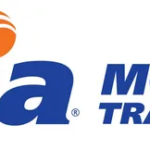Introduction
In recent years, the taxi industry has undergone a significant transformation, largely driven by the introduction of emerging technologies. Among these technologies, blockchain stands out as a disruptive force with the ability to completely change the way taxi apps operate. Blockchain, originally developed as the foundational technology for cryptocurrencies such as Bitcoin, has since found applications across a wide range of sectors, including transportation. In this post, we will examine how blockchain is impacting the taxi app development, from bettering efficiency and security to opening up new business opportunities.
1. Enhancing Security and Trust:
One of the primary challenges faced by traditional taxi apps is ensuring the security and trustworthiness of transactions between passengers and drivers. Incidents of fraud, disputes over fares, and concerns about passenger safety are not uncommon. Blockchain technology offers a solution to these challenges by providing a secure and immutable record of transactions. By storing trip data and payment information on a decentralized ledger, blockchain eliminates the possibility of tampering or manipulation, thereby enhancing trust between parties.
Smart contracts, a key feature of blockchain technology, further contribute to security by automating the execution of predefined terms and conditions. For example, smart contracts can automatically initiate payment to drivers upon completion of a trip, eliminating the need for manual intervention and reducing the risk of payment disputes. Additionally, blockchain-based identity verification systems can enhance passenger safety by ensuring that only authorized drivers are allowed to accept rides.
2. Improving Transparency and Accountability:
Transparency is another critical aspect of the taxi industry that can be significantly improved with blockchain technology. By recording trip data, including pick-up and drop-off locations, timestamps, and fare amounts on a public ledger, blockchain ensures transparency and accountability for all stakeholders. Passengers can verify the accuracy of their trip details, while drivers can track their earnings and performance metrics in real time.
Moreover, blockchain-based reputation systems can help establish trust between passengers and drivers by allowing them to rate and review each other after each trip. These ratings and reviews are recorded on the blockchain and cannot be altered or manipulated, providing an accurate reflection of the parties’ behavior and performance over time. This transparency fosters a culture of accountability and incentivizes both passengers and drivers to maintain high standards of service.
3. Facilitating Peer-to-Peer Transactions:
One of the most intriguing possibilities enabled by blockchain technology is the facilitation of peer-to-peer (P2P) transactions within the taxi industry. Traditional taxi apps typically operate on a centralized platform, with the app company acting as an intermediary between passengers and drivers. This centralized model often results in high fees and commissions, which can eat into drivers’ earnings and increase costs for passengers.
Blockchain-based taxi apps, on the other hand, have the potential to disrupt this model by enabling direct P2P transactions between passengers and drivers. Through decentralized platforms powered by blockchain technology, passengers can connect directly with nearby drivers without the need for intermediaries. This not only reduces transaction costs but also empowers drivers to earn a higher share of the fare and gives passengers more control over their transportation choices.
4. Enabling Decentralized Autonomous Organizations (DAOs):
In addition to P2P transactions, blockchain technology enables the creation of decentralized autonomous organizations (DAOs) within the taxi industry. DAOs are self-governing entities that operate without centralized control, relying instead on smart contracts and blockchain technology to automate decision-making processes.
In the context of taxi apps, DAOs can take various forms, such as cooperatives or collective ownership structures, where drivers collectively own and manage the platform. By leveraging blockchain technology, DAOs can distribute decision-making power and profits more equitably among stakeholders, leading to fairer and more democratic governance models.
Furthermore, DAOs can incentivize drivers to participate in the growth and development of the platform by rewarding them with tokens or other forms of digital assets. These incentives can help attract and retain drivers, ultimately leading to a more sustainable and inclusive ecosystem for both passengers and drivers.
5. Streamlining Operations and Improving Efficiency:
Finally, blockchain technology has the potential to streamline operations and improve efficiency within taxi apps by optimizing processes such as payment settlements, identity verification, and data management. By automating these processes through smart contracts and decentralized protocols, blockchain reduces the need for manual intervention and eliminates inefficiencies associated with traditional centralized systems.
For example, blockchain-based payment systems can facilitate instant and low-cost transactions between passengers and drivers, bypassing traditional banking intermediaries and reducing transaction fees. Similarly, blockchain-based identity verification systems can streamline the onboarding process for new drivers, reducing administrative overhead and improving the scalability of the platform.
Conclusion:
In conclusion, emerging technologies like blockchain are playing an essential role in shaping the future of taxi apps. By improving security, transparency, and trust, blockchain is transforming the way drivers and riders interact within the taxi industry. From facilitating P2P transactions to enabling decentralized governance models, blockchain has the potential to improve the inclusiveness, efficiency, and sustainability of the ecosystem for all parties involved. As blockchain continues to grow and develop, we may anticipate additional developments and upheavals in the taxi sector, ultimately leading to a more connected and decentralized transportation landscape.



